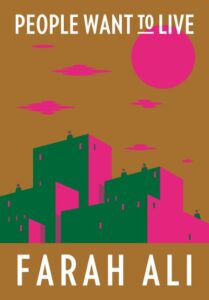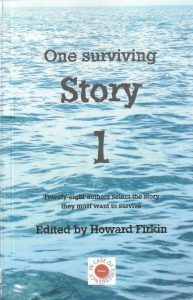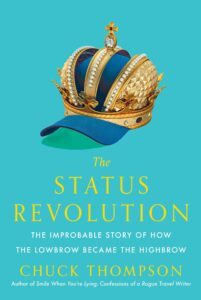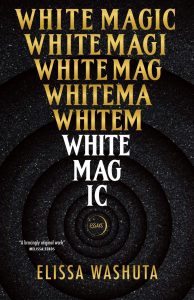Short Fiction. 222 pgs. McSweeney’s. October 2021. 9781952119293.
As international news coverage paints its own picture of Pakistan filled with political unrest, author Farah Ali honors her homeland by stepping away from the media sensationalism and instead reveals an intimate and poignant portrait of its citizens, specifically in the city of Karachi, in her debut short story collection, People Want To Live. Ali takes artistic risks when crafting each story as she artfully and poetically plays with voice, from first to second to third person, whether centering the short story on a marginalized character or an unlikeable character but not without diving first into the intersections of class, age, gender, religion, privilege, or the lack thereof. Where the everyday lives of Pakistani citizens are either exoticized or minimized, Ali centers her people in these intimate stories, where life is not simply about survival but that the search for meaning amidst any circumstance—privileged or disadvantaged, young or old, rich or poor—gives us a reason to want to live.
In “Foreigners,” Ali paints a caricature of an interview with a Pakistani couple conducted by a United States immigration official at the American Consulate. Is it a caricature? Told through the eyes of the immigration official himself, Ali not only captures an elderly couple being othered during the interview process, but the microaggressions and patronizing attitude directed at them.
“Would you also write [your name] both ways, ma’am? Ameenah. You look pleased that I got it right. Look at the smooth curves and dips in the letters of your own language. Positively poetic. I will keep this paper for my records” (68).
Ali’s ability to carefully place sentences such as the one quoted above allow us to not only see the invasiveness and veiled niceties of the interviewer but we ultimately catch on to the discrimination and biases that visitors and immigrants likely face as they seek to enter this country.
In some aspects, Ali’s storytelling is reminiscent of O. Henry’s “The Gift of the Magi” or Guy de Maupassant’s “The Necklace,” where twist endings are subtle and yet profound, revealing not only the good intentions of a character but also their naiveté and at times self-righteousness. Where class privilege mixed with personal insecurities can have disastrous effects on how the privileged versus the disadvantaged interpret a situation, “An Act of Charity” shows a couple who perceives themselves inferior to the success of their friends and decides to “rescue” their friend’s maid from what they impulsively and presumptuously conclude as mistreatment while making her an experiment of their lofty ideas and empty promises for better employment. The couple’s complete failure to recognize the class disparity that sets the maid apart from their own class privilege only leads readers to surmise the serious financial ramifications that await the maid while we can safely assume the couple suffers little consequence from their own flippant actions.
Ali’s stories compel us to consider the complexity of each character’s circumstance where the difference between right and wrong is not always black and white. In “Loved Ones,” a young mother struggles between fulfilling her domestic responsibilities and caring for her own mental health, where someone’s life can feel like a very delicate balance between duty and sanity. Likewise in “What’s Fair?” and “Believers,” an honest living is called into question as marginalized lives stuck in the endless debilitating cycle of poverty are revealed, where characters refuse to lose sight of their own conscience even when following that conscience may never improve their situation.
What ultimately binds readers to Ali’s characters is the universal subject of family, whether that family takes shape among biological family, chosen family, happenstance family as we particularly see in an orphanage in “Beautiful,” or the simple yearning for a family. In “Heroes,” a mother grieves for her dead teenage son while grappling with the reality of his drug use, adding to her conflicting emotions as she looks back on what kind of son he had been, versus the inaccurate model-son narrative people want to believe. It’s within the family that we see intimate connections being made or broken where we might not only sympathize but empathize with the characters, whether they are fighting, loving, deceiving, neglecting, or supporting one another.
What is usually viewed on the news regarding Pakistan are trauma-filled images regarding violence against women or the continual war with India over Kashmir, which begs the question of how many people in America, besides Pakistani-Americans themselves, really know what everyday life in Pakistan is like outside of political unrest. Ali reveals a Pakistan that is filled with people who still get up in the morning, get ready for work or school, have spats with their children, struggle to care for their families, grapple with despair, laugh at silly jokes, and have dreams and aspirations—where religion, class, and gender politics can reflect a completely different landscape than lives in America while at the same time, intimate moments universally mirror our own.
Ali reminds us that the everyday people of Pakistan are simply like ourselves, where her deft storytelling allows us to examine what drives her characters to be who they are and why they make certain decisions, even when those decisions may not be in their best interest or those around them. As her title reminds us: her characters will do what we ourselves might ordinarily not want to do but ultimately must given the circumstances, not just to survive, but that in some way, our lives may still hold meaning among those of us who want to live.
People Want to Live is available through McSweeney’s. Purchase it now through their website.
Like what you’re reading?
Get new stories or poetry sent to your inbox. Drop your email below to start >>>
OR grab a print issue
Stories, poems and essays in a beautifully designed magazine you can hold in your hands.
GO TO ISSUESNEW book release
Ghosts Caught on Film by Barrett Bowlin. Order the book of which Dan Chaon calls “a thrilling first collection that marks a beginning for a major talent.”
GET THE BOOK



